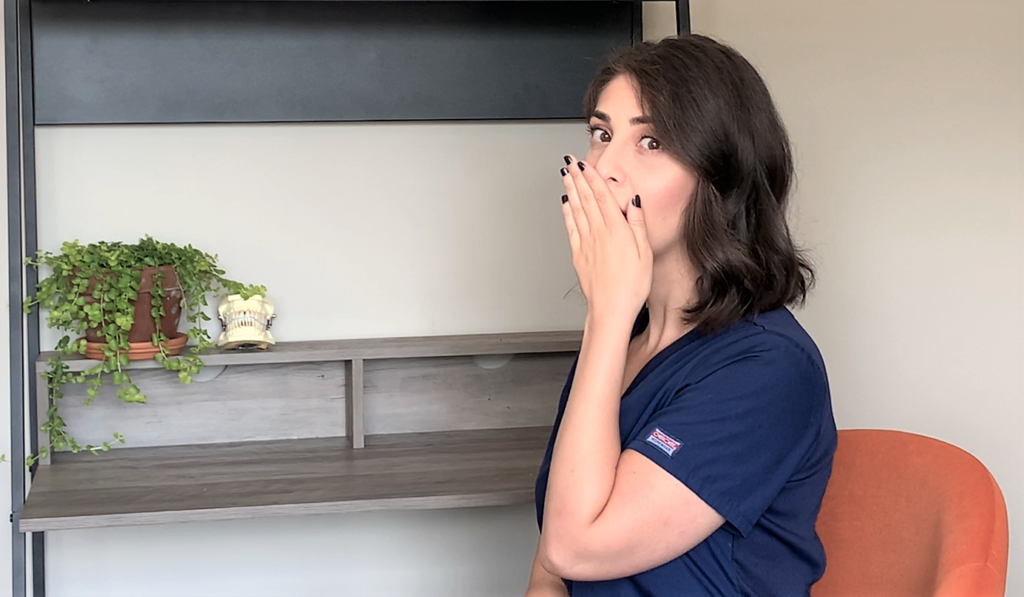
No one likes having bad breath. Let’s be real, it can be super embarrassing! Halitosis or oral malodor are clinical terms for bad breath and whether you’re experiencing occasional or chronic bad breath, it can affect both your personal and professional life.
Unfortunately, fighting halitosis is not always as easy as staying away from garlic! There are many factors that can contribute to both occasional and chronic bad breath and once you know what causes bad breath, you can then look for ways to prevent and treat it easier.
So let’s look at common causes of bad breath and how you can treat it!
1. Poor Oral Hygiene
The most common cause of bad breath is poor oral hygiene. The bacteria that lives in your mouth will feed on the plaque left in between your teeth and your tongue (yes, plaque can also build up on your tongue!) and release volatile sulfur compounds which cause your bad breath.

Luckily this has an easy solution, and that is to maintain good oral hygiene. So what do I mean by good oral hygiene?
- You should aim to brush your teeth twice a day. Ideally, you would brush after each meal but twice a day will do.
- Try to clean in between your teeth on a daily basis. The spaces in between your teeth make up about 40% of your teeth surfaces. That’s a lot of surface area for the odor-producing bacteria to thrive and cause bad breath. If you struggle with flossing consider flossing alternatives like interdental brushes.
- Use a tongue scraper. this little device will help you clean up all the build-up on your tongue and reduce your chances of having bad breath. Trust me, you will be surprised by how well this works! If you have a sensitive gag reflex, please be gentle with your tongue and go back as far as you can comfortably tolerate.
2. Dry Mouth (Xerostomia)
Your saliva acts as a cleaning agent for your mouth. Not having enough of it will give odor-causing bacteria a better chance to grow and cause bad breath. Dry mouth can be caused by excessive coffee drinking, continuously breathing through your mouth and certain medications (ADHD medication, diuretics and antihistamines to name a few).

If you have dry mouth here are some solutions to help increase your saliva production:
- Drink plenty of water
- Consider using Biotene products and/ or xylitol mints and gums
3. Diet
It’s no secret that certain foods like garlic and onion can affect how your breath smells, so maybe stay away from a super garlicky dish right before an important meeting (unless of course you’re on a vampire hunting mission!). However, this is really just a temporary issue and the bad smell will go away.

In the meantime, here are some quick fixes to minimize the odor:
Drink green tea 🍵 – Green tea acts like a deodorant for your mouth and it’s a great option for fighting bad breath.
Eat green vegetables and herbs or drink their juices (without added sugar) – Kale, parsley and cucumber can temporarily neutralize the odors.
Use sugar-free gums or mints
I want to point out that all these options are temporary fixes (for temporary halitosis) and won’t actually cure bad breath! The same goes for mouthwashes and breath sprays.
Ketogenic Diet

This is another dietary habit that can cause temporary bad breath. When you start a keto diet, your body will start producing ketone bodies and exhaling some as well. These ketone bodies will give your breath a particular nail-polish like smell. Fortunately not everyone will experience this, but in case you’re experiencing “keto-breath” here are 2 ways to to help alleviate the smell.
- Drink water – This will help your body flushing out the ketones through urination.
- Stay consistent with your diet – your body needs time to adjust to the new diet.
4. Smoking

Smoking cigarettes is associated with many health risks such as lung cancer and oral cancer. To add to the many harms of smoking, it can also cause chronic halitosis and severe dry mouth (extra dose of bad breath!). So please consider quitting.
When Is It Time To Visit Your Dental Hygienist/ Dentist?
If you feel like none of the causes we talked about apply to you, you’re on top of your at home oral hygiene routine and you’re still noticing consistent bad breath, then it’s time to visit your dental hygienist/ dentist and ask for help. There are few causes that your dental care provider may diagnose:
- Oral Diseases and Infections – These include problems like dental decay and gum disease
- Other Underlying Health Issues – diabetes, GI issues, liver and kidney disease to name a few (in these cases you will need to visit your primary care physician and/ or an ENT specialist).
Don’t Be Embarrassed To Ask For Help!
Halitosis or bad breath is a very common issue and a lot of people will experience it at some point. While realizing that you’re breath smells bad can be very embarrassing, please don’t feel embarrassed to ask your dental care provider for help. Trust me, we will be very excited to help you!
Happy tongue scraping!
Saba, RDH
References
Mark, A. M. (2015). Targeting bad breath. The Journal of the American Dental Association, 146(12), 932.
Renvert, S., Noack, M. J., Lequart, C., Roldán, S., & Laine, M. L. (2020). The Underestimated Problem of Intra-Oral Halitosis in Dental Practice: An Expert Consensus Review. Clinical, Cosmetic and Investigational Dentistry, 12, 251.
Wilkins’ Clinical Practice of the Dental Hygienist. (2020). (n.p.): Jones & Bartlett Learning.


